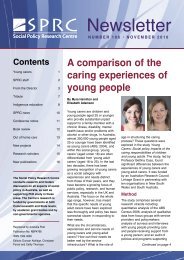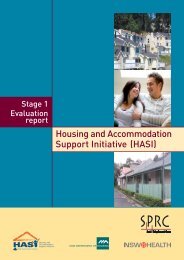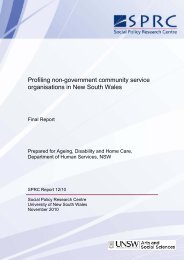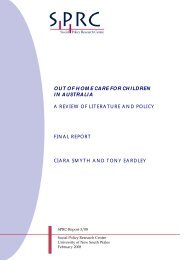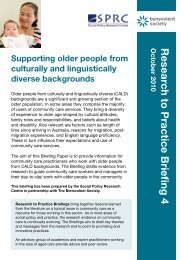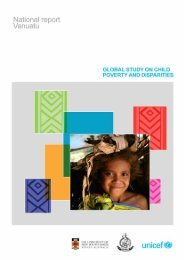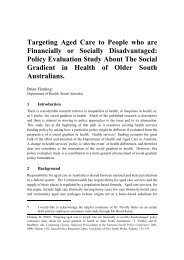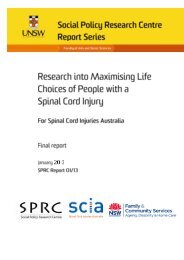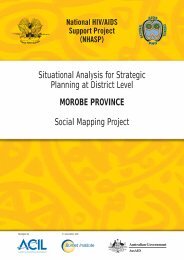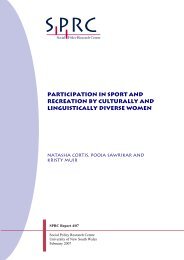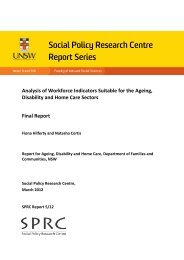A Strategic Assessment of the Children's Services Industry
A Strategic Assessment of the Children's Services Industry
A Strategic Assessment of the Children's Services Industry
- No tags were found...
You also want an ePaper? Increase the reach of your titles
YUMPU automatically turns print PDFs into web optimized ePapers that Google loves.
STRATEGIC ASSESSMENT OF THE CHILDREN’S SERVICES INDUSTRYQUEENSLANDIntegrated Service Delivery - Child and Family Support HubsIn Queensland <strong>the</strong>re has been a significant focus on <strong>the</strong> development <strong>of</strong> integrated servicesthat deliver a range <strong>of</strong> early childhood education, child care and family support services tomeet <strong>the</strong> individual needs <strong>of</strong> children, families and communities and which promote <strong>the</strong>efficient and effective use <strong>of</strong> community infrastructure. Integrated service delivery covers arange <strong>of</strong> service types including universal, targeted and intensive support services.Child and Family Support Hubs are an innovative model <strong>of</strong> service delivery that has beensuccessful in delivering integrated services particularly in rural, remote and Indigenouscommunities. In this model, a hub is defined as a multi-functional and highly flexible servicefocussing on activities for families with young children as a universal entry point, withwraparound family support services. The core <strong>of</strong> <strong>the</strong> hub is a specific child care service –<strong>of</strong>ten a limited hours care service. The hubs may take <strong>the</strong> form <strong>of</strong> a ‘one-stop-shop’ or anetwork <strong>of</strong> integrated services but all respond to <strong>the</strong> identified and emerging needs <strong>of</strong> <strong>the</strong>local community.As at 31 December 2007 <strong>the</strong>re are 27 hubs, including six Indigenous hubs established acrossQueensland which deliver a range <strong>of</strong> child and family support services. In <strong>the</strong> majority most<strong>of</strong> cases, hubs have been established in existing services, with a small number involving <strong>the</strong>establishment <strong>of</strong> a new service, most <strong>of</strong>ten in rural and remote areas where child and familysupport services did not previously exist. Hubs operate from a range <strong>of</strong> premises includingchild care centres, family day care coordination <strong>of</strong>fices, schools, neighbourhood centres, andin a number <strong>of</strong> cases, purpose built facilities.Rural and Remote Area <strong>Services</strong>The Queensland Government is committed to <strong>the</strong> provision <strong>of</strong> quality children’s servicesthroughout <strong>the</strong> State. In particular, <strong>the</strong> Government is actively engaged in providinginnovative early childhood and support services to children and families living in rural,remote and isolated locations within Queensland.A successful Rural Children’s Programme initiative is Frontier <strong>Services</strong>, which though itsRemote Area Family Service provides a range <strong>of</strong> practical programmes targeting families andchildren, particularly those under five years <strong>of</strong> age, through mobile services.The Remote Area Family Service operates across an area <strong>of</strong> one million square kilometresserving approximately 1500 families with 2500 children on remote rural properties. Themobile child care services provide opportunities for isolated families to receive earlychildhood education and care programmes and to interact through playgroups and parentseducation sessions. Department <strong>of</strong> Communities funding is used to employ early childhoodstaff and provide resources for young children.Indigenous - Children’s <strong>Services</strong> Skilling Plan 2006-09The Children’s <strong>Services</strong> Skilling Plan 2006-09 (Skilling Plan) is a joint initiative <strong>of</strong> <strong>the</strong>Department <strong>of</strong> Education, Training and <strong>the</strong> Arts (DETA) and <strong>the</strong> Department <strong>of</strong>Communities, formalised by a Memorandum <strong>of</strong> Understanding signed in October 2006, toassist child care workers to access affordable child care training to meet <strong>the</strong> qualificationsrequirements <strong>of</strong> <strong>the</strong> Child care Act 2002 and support quality child care for Queenslandfamilies.59



